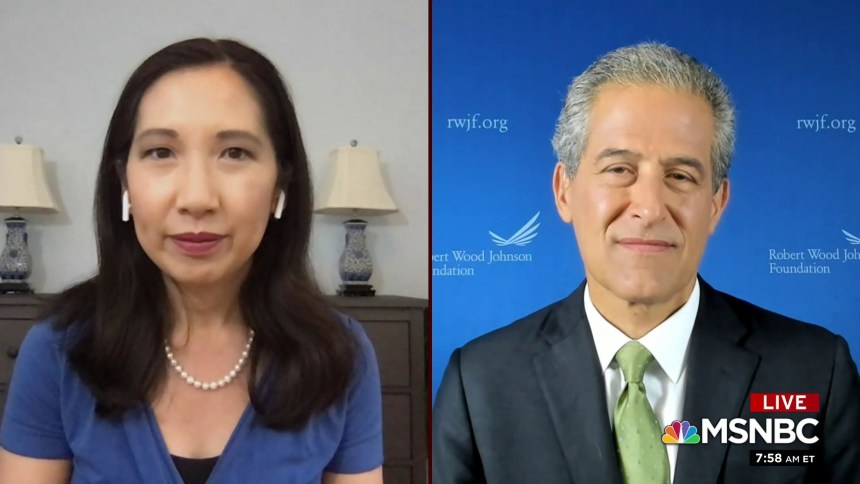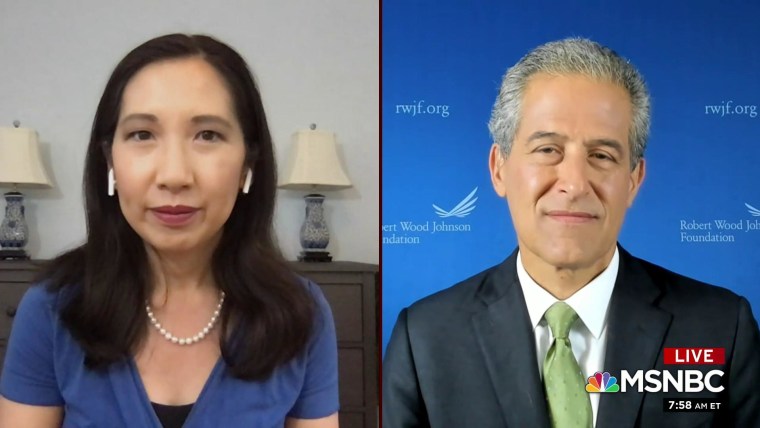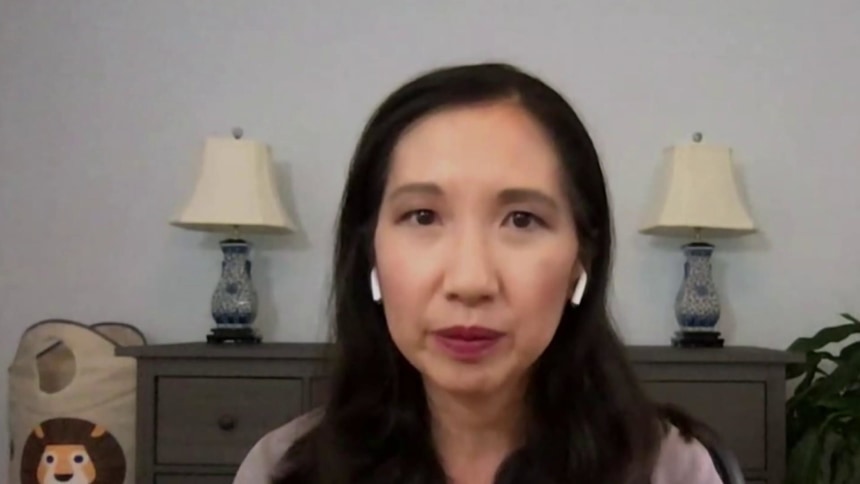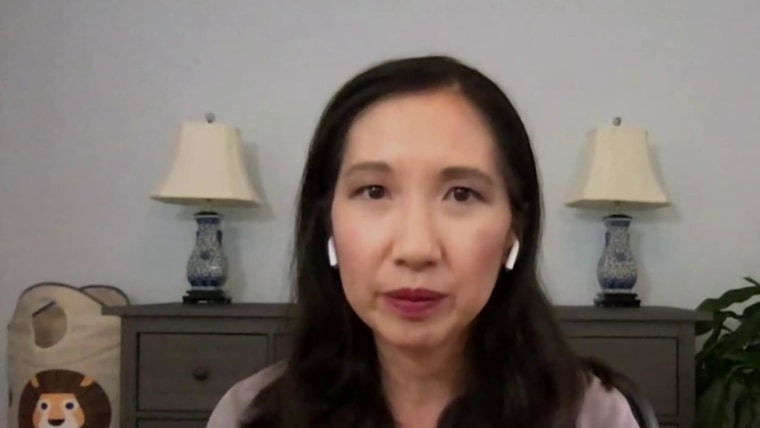PHYSICAL DISTANCING: SIX FEET APART IS BETTER THAN SIX FEET UNDER!

CORONAVIRUS DASHBOARD
Dr. Leana Wen: 5 questions to ask yourself when contemplating summer travel
Mika Brzezinski recently chatted with the emergency physician and former health commissioner for Baltimore about special precautions to keep in mind.
By Know Your Value staff
Americans have never been more ready than to get out of the house.
But as states reopen and travel restrictions ease up amid COVID-19, many are wondering if it’s safe to hit the road or get on a plane this summer — and if there are any special precautions that should be taken.
Know Your Value founder and “Morning Joe” co-host Mika Brzezinski recently asked Dr. Leana Wen, an emergency physician and former health commissioner for Baltimore, for her advice. Dr. Wen said there are five questions to ask yourself when you’re deciding whether and how to travel:
1. Is the trip essential?
“Travel exposes you to people, and there are new considerations with coronavirus. Ask yourself if the trip is something you must take,” advised Dr. Wen. “You might decide it's necessary to see an ailing relative, but that you can put off an optional work trip. Or that instead of flying across the country with your kids over summer break, you want to vacation somewhere within easy driving distance instead.”
2. Is the area I'm going to an emerging hotspot?
“There are surges of coronavirus happening in numerous parts of the country. It's best to avoid traveling to these areas if possible,” said Dr. Wen. “Look at not only the state but also the specific city and county you're going to. The map of these hotspots will change, so keep a close eye and be flexible with travel planning.”
3. Are there quarantine requirements?
This week, the governors of New York, New Jersey, and Connecticut announced a 14-day quarantine for visitors coming from states that have higher levels of infection.
“Other states may impose additional requirements in coming days,” said Dr. Wen. “Knowing the requirements will help you plan your trip: you don't want to go somewhere only to be in quarantine or be caught off guard when you need to be quarantined when you return.”
4. How long is the trip?
“Time of exposure is a major risk factor for increasing infection,” noted Dr. Wen. “A short flight or train ride would be safer than a longer one. Driving may be safer still, as you have more control over who is around you (just be extra careful at rest stops and sanitize your hands after touching high-touch surfaces like doorknobs).”
5. How can I limit the number of contacts?
“If you're going to be away for a period of time, renting a house is better than staying in multiple hotels,” said Dr. Wen. “A trip to go hiking will expose you to far fewer people than a visit to the amusement park. If you're going to the beach, try to go somewhere that is less frequented and that you can easily maintain a 6-foot physical distance.
Only two US states are reporting a decline in new coronavirus cases
(CNN)Only two US states are reporting a decline in new coronavirus cases compared to last week: Connecticut and Rhode Island.
A rise was reported in a staggering 36 states, including Florida, which some experts have cautioned could be the next epicenter for infections. Officials there and across the US are also warning of an increase in cases among younger people.
Florida reported 9,585 new coronavirus cases Saturday, a single-day record since the start of the pandemic. The number rivals those of New York's peak in early April (New York's new case tally Saturday was about 6% of Florida's). On Sunday, Florida's Department of Health reported another 8,530 new cases.
Florida Gov. Ron DeSantis said the state's surge in cases in the past week was the result of a "test dump," echoing an assertion from the White House that an increase in testing is resulting in the higher numbers.
The ex-head of the US Centers for Disease Control and Prevention contended the increase was actual, not an anomaly related to testing numbers, and warned more spread and deaths were in the country's future.
"As a doctor, a scientist, an epidemiologist, I can tell you with 100% certainty that in most states where you're seeing an increase, it is a real increase. It is not more tests; it is more spread of the virus," former CDC Director Tom Frieden told Fox News on Sunday.
In the South, the numbers are rising as a result of hasty reopenings, he said, and it's "going to continue to get worse for weeks." Deaths are not yet spiking because deaths lag infections by about a month, he said, estimating the nation will see at least 15,000 more deaths in the next month.
"This virus still has the upper hand," Frieden told Fox News.
Record numbers may underestimate cases
This all came as the United States broke another record, reporting the highest number of new cases in a single day Friday with at least 40,173 new infections.
The daunting numbers could be "a tip of the iceberg," Frieden said. A CDC survey suggests the total number of coronavirus infections across the US could actually be six to 24 times greater than reported.
As cases spike, US travelers are "unlikely" to be allowed into the European Union as the bloc begins opening up to international travel, several EU diplomats told CNN.
Officials in parts of the US are now trying to reel in the spread of the virus -- which many experts have said is spiraling out of control -- by making pleas to the country's young population to keep their distance, urging the use of face masks and halting their reopening plans.
The US has now hit more than 2.53 million infections and at least 125,630 deaths, according to Johns Hopkins University.
Where new cases are on the rise
The 36 states reporting a rise in cases are: Alabama, Alaska, Arizona, Arkansas, California, Colorado, Florida, Georgia, Hawaii, Idaho, Illinois, Iowa, Kansas, Kentucky, Louisiana, Maine, Michigan, Minnesota, Mississippi, Missouri, Montana, Nevada, New Mexico, North Carolina, Ohio, Oklahoma, Pennsylvania, South Carolina, Tennessee, Texas, Utah, Vermont, Washington, West Virginia, Wisconsin and Wyoming
Cases are tracking steady in Delaware, Indiana, Maryland, Massachusetts, Nebraska, New Hampshire New Jersey, New York, North Dakota, Oregon, South Dakota and Virginia.
New York on Sunday boasted its fewest deaths -- five -- since March 15, and hospitalizations were below 900
About 1% of the tests conducted in the state Saturday were positive, resulting in 616 new cases in 43 counties, according to a news release from Gov. Andrew Cuomo's office.
States hit pause on reopening
At least 12 states halted or rolled back their reopening plans in hopes of curbing the spread of the virus.
Washington Gov. Jay Inslee announced Saturday he's hitting the pause button on the state's reopening plan due to rising cases. Some counties were preparing to enter the fourth phase of reopening, "which would essentially mean no restrictions," the governor's office said in a statement.
"Phase 4 would mean a return to normal activity, and we can't do that now," the statement said. "This is an evolving situation and we will continue to make decisions based on the data."
Texas Gov. Greg Abbott also announced last week he'd pause any further phases to reopen the state.
"I ask all Texans to do their part to slow the spread of Covid-19 by wearing a mask, washing their hands regularly, and socially distancing from others. The more that we all follow these guidelines, the safer our state will be and the more we can open up Texas for business."
A day later, Abbott also said he was closing bars and limiting restaurant capacity.
Arizona's governor has also announced that the state's reopening is on pause as a result of a major spike in cases.
"We expect that our numbers will be worse next week and the week following," Gov. Doug Ducey said.
Pleas to young groups
In recent days, officials across the US have reported a rise in cases among younger groups. In Mississippi, officials pointed to fraternity parties as one of the drivers behind the state's cases.
California Gov. Gavin Newsom said last week there's been an increase in younger groups testing positive for the virus.
"There is a sense that a lot of young people, well you're young so you feel a little bit more invincible but, respectfully, often that can be a selfish mindset," Newsom said.
In Florida, Gov. DeSantis said while the median age for those infected with the virus in March was in the 60s, in the past two to three weeks it's dropped to people in their early 30s.
The governor urged younger groups to be vigilant, saying while they may not be at risk for serious complications, they can pass the virus on to someone who is. The state's community transmission, he said, is "being driven by that 18 to 35-year-old group."
"You have a responsibility to be careful if you're in contact with somebody who is more vulnerable," he said. "We've been stressing avoiding the three Cs which are: closed spaces with poor ventilation, crowded places with many people nearby and close-contact settings, such as close-range conversations."
Meanwhile, three South Florida mayors have expressed concern with the rising number of cases: Miami Beach Mayor Dan Gelber says he is calling a special meeting to discuss how to improve and enforce mask usage compliance, which "has not been terrific"; Miami-Dade County Mayor Carlos Gimenez has ordered beaches to close for July 4 weekend; and Pinecrest Mayor Joseph Corradino wrote an open letter saying private house parties, which can't be policed like events in the public realm, were the biggest problem in his locale.
In addition to potentially spreading the virus to older people and those with compromised immune systems, family physician Dr. Jen Caudle said, young people face their own risks and it's important they not consider it "a walk in the park." She's had young patients suffer strokes, and others who've experienced shortness of breath, fatigue or loss of smell and taste long after their recovery, she said.
"Just because young people tend to fare better doesn't mean that they always do," she said. "It's really important that we wear our masks, that we social distance. Especially in places where Covid is increasing, it's honestly best to stay home."
By Christina Maxouris and Eliott C. McLaughlin, CNN
Updated 2:08 PM ET, Sun June 28, 2020
CNN's Melissa Alonso, Andy Rose, Artemis Moshtaghian, Kristina Sgueglia, Gisela Crespo, Michael Nedelman and Wes Bruer contributed to this report.








No comments:
Post a Comment